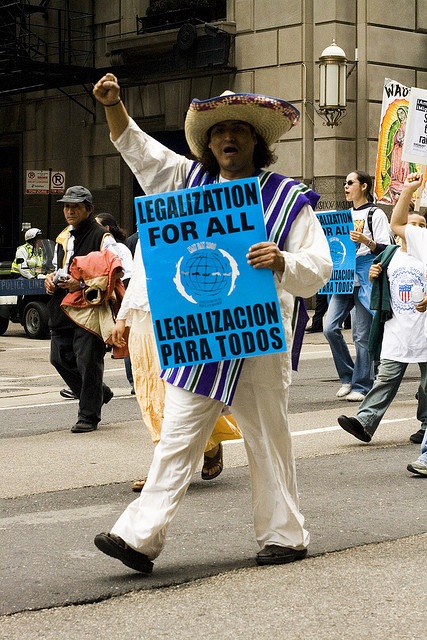Why can’t anyone wearing a suit understand the connection between permissive immigration (legal and illegal) and American unemployment? Do universities no longer teach supply and demand in Econ 101?
To liberals and their media poodles, there is no contradiction between a segment on a suffering long-unemployed American worker followed by an item about mass legalization with immediate work permits for millions of illegal aliens. (To elite Washington, the jobless American needs more unemployment benefits, and the illegal alien, who does just fine without “papers” as shown by length of residence, needs legalization for jobs.)
Which is exactly what happened on ABC’s “This Week” on January 5:
Here’s the transcript showing some highlights of elite thinking about unemployment and amnesty:

ZELENY: We met Kathy Biscotti of Baltimore, one of the 1.3 million Americans whose benefits expired late last year. She’s looking for a new job and asking congress for help.
KATHY BISCOITT, UNEMPLOYED: I’m not saying that it should last forever, but we need more time. What are we supposed to do in the meantime?
A few minutes later, Senator Rand Paul was chatting up his economic freedom zones to increase employment.
PAUL: Well, I think what’s really cruel is to have an economy that doesn’t have jobs in it. So we have to talk about what policy creates jobs. With regard to unemployment insurance, I’ve always said that I’m not opposed to unemployment insurance, I am opposed to having it without paying for it.
I think it’s wrong to borrow money from China or simply to print up money for it. But I’m not against having unemployment insurance.
I do think, though, that the longer you have it, that it provides some disincentive to work, and that there are many studies that indicate this. So, what I’ve been saying all along, we have to figure out how to create jobs and keep people from becoming long-term unemployed. That’s why I promoted the economic freedom zones which would dramatically lower taxes in areas where there’s long-term unemployment.
And then Senator Paul said he wants mass legalization for the illegals who can then lawfully snatch American jobs even though the result world be even worse hurt for US citizens. He believes in “very expansive work visas” — not just easy farm picker entrance, but the whole range of employment. He must be on the Mark Zuckerberg list of campaign check recipients, er friends. The billionaire Facebook founder met with Sen. Paul in a sit-down meeting last spring in Silicon Valley, and it’s likely that increased tech visas were discussed. The anti-sovereignty lobby, which now includes Zuckerberg, has spent $1.5 billion since 2007 to open American borders.
STEPHANOPOULOS: A final question. I want to get you on the record on immigration.
Our next guest, Senator Chuck Schumer of New York, is confident that it’s going to get done, a comprehensive bill will eventually get done this year.
Is he right?
I know you were opposed to the comprehensive bill earlier in the year.
But can you support Speaker Boehner’s call for a series of measures on immigration?
PAUL: Yes. The reason — and I’ve had this conversation with Senator Schumer before — is that the reason it has failed is that the Senate bill that he proposed actually limited work visas and, I think, creates an incentive for more illegal immigration.
I’m for very expansive work visas. If you want to come to our country or if you’re one of the 11 million who are here, I’m for giving you a work visa.
There is a debate, though, over citizenship and how quickly. I don’t think the House is ready for citizenship.
So, really, the question to Democrats is will you go halfway?
Are you willing to try to bring the 11 million people who are here, bring them out of the shadows, give them an existence, try to have — be more humane and try to get them a better situation for them?
That could happen tomorrow. The problem is, is the sticking point going to be we have to have immediate voting privileges for those who came here illegally?
I think that’s more of a sticking point.
If the Democrats are willing to come halfway, I think we can pass something — some meaningful reform that would help the 11 million who are here.